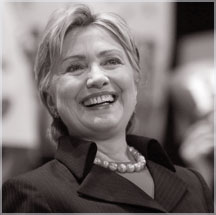Can Hillary Clinton still win?
By Molly Levinson
The more things change, the more they stay the same.
After a slew of primary and caucus victories for Barack Obama - who
has been out-organising Hillary Clinton's machine, and getting months of
media adulation - he has been suddenly stopped short of coronation.
Mrs Clinton won in Ohio, Texas and Rhode Island, and once again, the
race is on.

Even more importantly, it seems for the first time in a long time
that her message of experience and getting things done may outweigh his
call for change.
Yet despite Mrs Clinton's burst of momentum, and Obama's success, it
is impossible for either one to secure the 2,025 delegates that would
give them the Democratic nomination with pledged delegates alone.
Both need the support of many of the 796 super-delegates - the
elected officials and party dignitaries who have special voting rights
in the nominating process - to get the nomination.
So, despite months of glee over big turnouts and voter enthusiasm,
the hand-wringing has begun anew in the Democratic Party over how to get
to a nominee.
Obama's upper hand
There are two mathematical realities that matter to both campaigns.
First, winning delegates does not necessarily mean winning the
popular vote. Mrs Clinton's victories in a pile of big states including
New York, New Jersey, California, Texas, Ohio and Massachusetts have
kept her within striking distance of taking the popular vote from Obama·
Second, no matter how well Mrs Clinton does in the remaining state
contests, come June - at the end of the primary and caucus season - Mr
Obama will have more pledged delegates than she will
Mr Obama also has a clear upper hand with super-delegates so long as
he has the majority of pledged delegates and the majority of the popular
vote.
Harrison Hickman, a prominent Democratic pollster and advisor to John
Edwards, has a theory for the reason behind the reluctance among
super-delegates to veer away from the candidate with the pledged
delegate lead. He calls it "Gore Guilt".
He says that Democratic voters felt so bruised by the 2000 election -
in which former Vice President Al Gore went all the way to the Supreme
Court to fight for lost Florida votes that could have made him president
- that they are reluctant to allow the nomination to be decided by a
cabal of elected officials and party dignitaries voting in accordance
with their own personal beliefs.
Yet it is precisely this argument that Mrs Clinton will have in her
corner if she can win the popular vote. If Mr Obama is forced to argue
that he has more delegates while Mrs Clinton has more votes, his
position is dramatically weakened, especially given the history of the
very party that was forced to put up with the Bush administration for
eight years, despite Mr Gore winning a clear majority of votes in 2000.
Recent polling confirms this. A 6 March Rasmussen poll shows that 57%
of Americans think the candidate with the most votes should win the
Democratic nomination. Only 26% of Americans think the candidate with
the most delegates ought to win.
Along those lines, Mrs Clinton's path to the nomination depends on
accomplishing three things.
No room for error
First, Mrs Clinton must win the popular vote so that she can present
her majority as a reason for super-delegates to get behind her.
Second, Mrs Clinton must also lessen the gap between her number of
pledged delegates and Mr Obama's. Mr Obama already has one more caucus
victory this week: Wyoming, which he won by a large margin on Saturday.
He is also favoured in the upcoming contests in Mississippi and North
Carolina. Mrs Clinton must win decisively in Pennsylvania, West
Virginia, Kentucky, Indiana and Puerto Rico. Florida and Michigan, two
states which have been disqualified from the process for breaking with
party rules, also hang in the balance. Finally, Mrs Clinton must prove
resoundingly that she is the more electable of the two candidates in a
general election and would be a better president. She must combat Mr
Obama's claim to the mantle of change and at the same time emphasise her
credentials to prove that she is best able to beat John McCain
Super-delegates do not have to vote until the end of August, at the
Democratic Convention in Denver.
Six months is plenty of time to build an unbeatable argument for
super-delegate support - but there is little room for error and almost
no room for losses.
-BBC |
